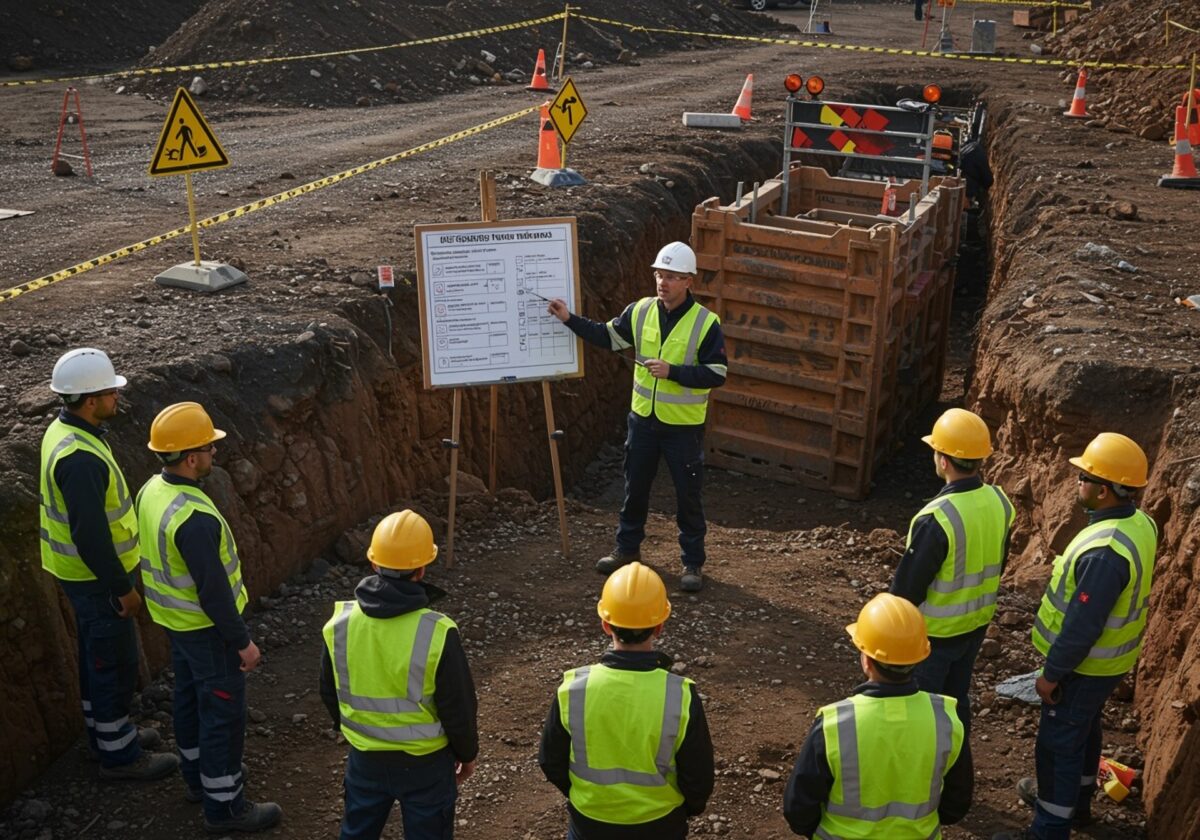Australia’s mining industry powers our economy, but it faces some of the nation’s toughest workplace safety risks. From the Pilbara to the Goldfields, every site relies on statutory supervisors to protect people and operations.
A WHS statutory mining supervisor course builds the skills supervisors need for safe, legally compliant operations. This specialist course builds on safety, health, and compliance training to prepare Statutory Supervisors with the skills to earn government-backed certification.
What are Statutory Roles in Mining?
Statutory Supervisors are appointed to oversee operations and compliance in mining operations, especially in high-risk areas. Individuals in these roles have responsibilities like:
- Operational oversight and task management.
- Hazard identification and control.
- Safety compliance and reporting.
There are five key statutory roles in mining:
- Site Senior Executive (SSE): The mine’s most senior person, responsible for operations – and therefore health and safety compliance. SSE is a notifiable position.
- Exploration Manager: Responsible for control and management of exploration operations, and a stand-in SSE when no SSE is appointed. Exploration Manager is the second notifiable position.
- Underground Mine Manager (coal and non-coal): If the mine operates underground, an individual must be appointed to the Underground Manager statutory position.
- Quarry Manager: The above-ground equivalent of an Underground Manager, this statutory role oversees operations and safety in quarrying activities.
Alongside these five key roles, there is a long list of statutory positions that could apply depending on a mine’s specific operations. That list includes:
- Statutory Supervisor: Front‑line supervisor in high-risk work areas who carries legal responsibility for safety in WA, current transitional arrangements run through 30 March 2026.
- Specialist Roles: e.g. Electrical Supervisor, Noise Officer, Authorised Surveyor, each mandated under regulations like WA’s WHS (Mines) Regulations 2022.
All statutory roles require deep knowledge of safety regulations, site-specific control, and company codes of practice. Statutory appointees must apply this knowledge under pressure in high-risk settings. They are the frontline defence against harm, breaches, and disruptions.
Read more about statutory positions and notification requirements at WorkSafe WA.
What are the Key Responsibilities of a Statutory Supervisor?
Mines can (and often do) have more than one Statutory Supervisor. One must be appointed for each high-risk work area, including the processing plant, lab, quarry, and workshop. Their role includes:
- Conducting risk assessments: Supervisors identify hazards, assess risk, and apply proven controls tailored to their site.
- Implementing safety protocols: Involves converting WHS laws into clear procedures, monitoring compliance, and updating rules as risks evolve.
- Incident reporting and investigation: After any incident, supervisors report fast, gather evidence, analyse causes, and drive lasting fixes.
- Leading a safety-focused culture: Their visible leadership inspires open dialogue, reinforces safe habits, and rewards actions that protect the crew.
Why is the WHS Statutory Mining Supervisor Course a Must for Mining Companies?
Mining remains one of the most dangerous industries in Australia and globally, with fatalities reaching record levels in early 2025. This sharp increase, alongside national Work, Health, and Safety Report data showing that mining consistently has one of the highest fatality rates, underscores the importance of robust statutory training.
Around 80% of serious injury claims involve body stress, falls, slips, trips, moving objects, or mental stress. These risks can be life-threatening, so shortcuts are not an option. Statutory training equips appointees with the practical skills and legal knowledge to safeguard everyone on site.
Learn more: Empowering Workplace Safety: The Vital Role of HSR Training in Perth.
Statutory Supervisor Training in Perth
ATI-Mirage offers a 3-day WHS statutory mining supervisor course as part of our comprehensive WHS courses in Perth. The course, designed to comply with the Western Australian WHS (Mine) Regulations 2022, builds practical skills in WHS supervision, safety management, legal compliance, and incident response. It includes two nationally recognised units required under WA’s Schedule 26:
- BSBWHS411 – Implement and monitor WHS policies and procedures
- BSBWHS414 – Contribute to WHS risk management
What You’ll Get
Our course covers everything Statutory Supervisors need to know before sitting the Department of Department of Local Government, Industry Regulation and Safety (LGIRS) examination. This examination is managed by LGIRS, and will become a legal requirement for anyone in statutory roles in April 2026.
Work Health and Safety (WHS) Training in Perth
ATI-Mirage offers a range of practical WHS courses in Perth, delivered by expert trainers at our CBD training centre or on-site at your workplace. All courses focus on real-world applications, small-group learning, and current Western Australian WHS legislation.
We offer flexible delivery options and can tailor sessions to your organisation’s needs.
Courses We Offer
- Mental Health First Aid (MHFA).
- Health and Safety Representatives Training (including Refresher).
- Statutory Supervisor Pre-Exam Preparation.
- Statutory Site Executive – Lead WHS Risk Management.
- Leading WHS for Supervisors and Managers.
- Psychological Safety @ Work.
What You’ll Get
All ATI-Mirage WHS training meets WA regulations and includes all materials, workbooks, and guides. You’ll receive a Certificate of Completion for each course and can access follow-up support after training.
The Real Costs of Inadequate Training
Inadequate training increases risk and weakens operational control. Supervisors without WHS expertise often misinterpret legal requirements or overlook key safety protocols, creating dangerous gaps in oversight and exposing crews to avoidable harm.
Poor training also damages morale. When leaders lack direction, workers lose trust, engagement drops, and turnover rises. Even if insurers cover financial losses, they can’t rebuild a culture shaken by poor preparation or restore confidence lost through repeated failures.
Building a Safer Future in Mining
Forward-thinking mining companies invest in regular WHS training to ensure their leaders are up to date with legislation and best practices. They make it part of their strategy, and set goals tied to training and certification. Training becomes a core operational capability, not just a legal box to tick.
Skilled supervisors lead innovation on the ground. They apply current WHS practices and utilise digital tools to track safety and run more effective prevention programs. These abilities support safer, more efficient, and more adaptable operations.
Most importantly, WHS upskilling reflects clear values. It demonstrates that the company prioritises people, plans for the future, and builds trust through its actions. That approach sets the standard for responsible leadership in the mining industry.
Invest in People to Build Safer Operations
Statutory Supervisors play a central role in safety and compliance across Australia’s mining industry. Pairing a WHS statutory mining supervisor course with broader safety, health, and compliance training gives supervisors the tools to lead safely and meet all legal obligations.
Call (08) 9218 9059 or email hello@ati-mirage.com.au to get started. Strong supervision saves lives, and it starts with ATI-Mirage.



